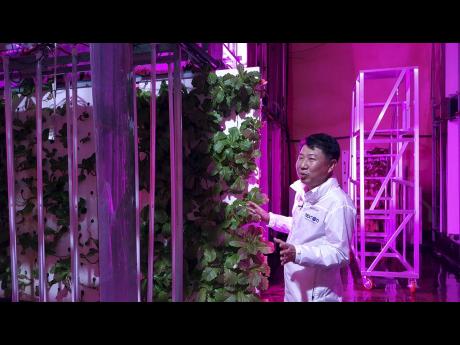Behind a blue wall that seals a former highway tunnel stretches a massive indoor farm bathed in rose-tinted light.
Fruits and vegetables grow hydroponically – with no soil – in vertically stacked layers inside, illuminated by neon-pink LEDs instead of sunlight.
Operators of this high-tech facility in South Korea say it is the world’s first indoor vertical farm built in a tunnel. It’s also the largest such farm in the country and one of the biggest in the world, with a floor area of 2,300 square metres (25,000 square feet), nearly half the size of an American football field.
Indoor vertical farming is seen as a potential solution to the havoc wreaked on crops
by the extreme weather linked to climate change and to shortages of land and workers in countries with ageing populations.
The tunnel, about 190 kilometres (120 miles) south of Seoul, was built in 1970 for one of South Korea’s first major highways. Once a symbol of the country’s industrialisation, it closed in 2002. An indoor farming company rented the tunnel from the government last year and transformed it into a ‘smart farm’.
Instead of the chirrups of cicadas, Claude Debussy’s Clair de Lune resonates in the tunnel in hopes of stimulating the crops’ healthy growth.
“We are playing classical music because vegetables also love listening to music like we do,” said Choi Jae Bin, head of NextOn, the company that runs the vertical farm.
Sixty types of fruits and vegetables grow in optimised conditions using NextOn’s own growth and harvest systems. Among them, 42 are certified as no-pesticide, no-herbicide and non-GMO products, said Dave Suh, NextOn’s chief technology officer.
He said the tunnel provides temperatures of 10 to 22 degrees Celsius (50 to 72 Fahrenheit), enabling the company to optimise growing conditions.
High-tech smart farms, used also in places like Dubai and Israel where growing conditions are challenging, can be a key to developing sustainable agriculture, experts said.








Leave A Comment